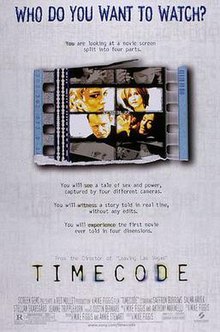|
Timecode (2000 film)
Timecode is a 2000 American experimental film written and directed by Mike Figgis and featuring a large ensemble cast, including Salma Hayek, Stellan Skarsgård, Jeanne Tripplehorn, Suzy Nakamura, Kyle MacLachlan, Saffron Burrows, Holly Hunter, Julian Sands, Xander Berkeley, Leslie Mann and Mía Maestro.[4] The film is constructed from four continuous 98-minute takes that were filmed simultaneously by four cameras; the screen is divided into quarters, and the four shots are shown simultaneously.[5] The film depicts several groups of people in Los Angeles as they interact and conflict while preparing for the shooting of a movie in a production office. The dialogue was largely improvised, and the sound mix of the film is designed so that the most significant of the four sequences on screen dominates the soundtrack at any given moment. PlotThe film takes place in and around a film production company office, and involves several interweaving plot threads which include a young actress named Rose who tries to score a screen test from her secret boyfriend Alex Green, a noted but disillusioned director. Meanwhile, Rose's tryst with him is discovered by her girlfriend Lauren, an insanely jealous businesswoman who plants a microphone in Rose's purse and spends most of the time in the back of her limousine parked outside the office building listening in on Rose's conversations. Elsewhere, Alex's wife Emma is seen with a therapist debating about asking him for a divorce. In the meantime, numerous film industry types pitch ideas for the next big hit film.[6] Cast
In the first run through, Headly's role as Dava Adair was performed by Laurie Metcalf. ProductionThe movie was shot with four hand-held digital cameras, in one take, on the sixteenth performance. Largely improvised, Figgis provided the actors with blank, four-staff music manuscript paper, with each octave representing a camera view at that particular moment in time, up to the 93 minutes of camera capacity. The actors themselves personally kept track of the activities occurring in other camera points of view that were relative to their performance. Rehearsals were single-take performances, filmed over fifteen days. Filmed in the mornings, with the actors fully involved, the footage was reviewed and discussed in the afternoons. Four separate monitors replayed each camera point of view simultaneously.[5][1] The first rehearsal recording was included as a bonus feature on the film's 2000 DVD release. The film's action ends with closing activity in three quadrants and the following statement (no capitalization beyond film's title) in the fourth quadrant:
ReceptionThe review aggregator website Rotten Tomatoes gave Timecode a rating of 68% from 81 reviews. The website's consensus reads, "Not much of a story, but the execution is interesting."[7] Metacritic gave the film a score of 65 out of 100, based on 31 critic reviews.[8] See alsoReferences
External links |
||||||||||||||||||||||||||||||||||
